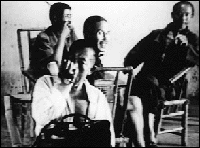|
|
|
監督・脚本・編集・音楽・録音:汪建偉(ワン・ジェンウェイ)
Director, Script, Editing, Music, Sound : Wang Jian-wei |
1958年中国四川省生まれ。1987年に浙江美術学院油画科で修士号を獲得。現在は職業画家として生活する。地方にある茶館でお茶を飲む村人を描いた「茶絵画」の連作は称賛を受け、国際的に展示された。『ポスト89中国ニューアート』(香港、93年)、『NEW ASIAN ART SHOW 1995』(大阪、東京、95年)、『95光州ビエンナーレ』(光州、韓国、95年)、『第2回ブリスベン・ビエンナーレ』(オーストラリア、96年)、『ドクメンタX』(カッセル、ドイツ、97年)などに出品している。 Born in 1958 in Sichuan Province, China. Received his Master's degree from the Oil Painting Department of the Zhejiang Academy of Fine Arts. Now makes his living as a professional artist. His acclaimed Tea painting series, showing villagers drinking in the local teahouse have been exhibited internationally. Exhibitions include " China's New Art, Post-1989 " (Hong Kong Arts Centre, 93 and Marlborough Fine Art Clondon Ltd, GB, 93), " New Asian Art Show - 1995 " (Osaka and Tokyo, Japan, 95), " 95 Kwangju Biennale " (infoART Kwangju, Korea, 95), " Asia-Pacific of Contemporary Art Triennial " (Brisbane, Australia, 96), " Documenta X Kassel " (Kassel, Germany, 97). |
 |
|
| 中国美術界の新進作家として日本を含め世界各地で注目を集めている汪建偉が、小型ビデオカメラを持って四川省の茶館で撮影した作品。情報伝達のメカニズムに着眼点を置いた彼のインスタレーションにも通じる、ものの形象と場の形成に、深い関心が表れている。 | A series of images of Sichuan teahouses shot with a handy camcorder by a young artist whose installations and paintings have been representative of Chinese contemporary art in exhibits around the world. The filmmaker explores emerging forms and space in the context of understanding a mechanism of information transmission, a theme that is also apparent in his installation works. |
|
|
|
|
監督のことば 『生産』の主な舞台は四川省の茶館。その「場」も「環境」も「会話」も人々の「行動」もすべてそこの「生産物」である。「発信・伝送・受信」という通信回路(すなわち歓談や噂話)を経ての交流や、日常の会話から現われる思考様式も、その茶館で見ることができる。茶館はその唯一の実用的機能(社会習俗としての機能)を外された場合、以下のような多機能的な場所として出現する。
生活様式や「自然」な社会的日常的身振りを視線へと届けながら、茶館は個人と社会との間にある相互に対象的な関係を「匿名で」描写しているのです。 |
Director's Statement The main setting of Production is a Sichuan tea-house, where the place, environment, conversation,
and people's behavior are the " products. " Also presented at
the teahouse are conversations delivered by way of " expressing-transmitting-receiving
" (i.e., conversing and gossipping) of messages and the mode of
thinking deriving from the conversations in everyday life. The
teahouse, rid of its sole and practical function (that of folkways)
is presented as a multi-functional place:
By showing a way of life and "natural" social daily con-ducts, the teahouse "anonymously" depicts a mutually- targeted relationship between the individual and the public. |
